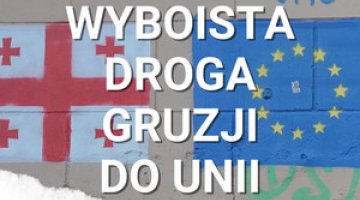Georgia: a strong political crisis over legislative changes
On 9 March, the parliamentary majority withdrew the draft law ‘On the Transparency of Foreign Influence’, which had been adopted two days earlier at the first reading (it had previously been decided that the other draft, ‘On the Registration of Foreign Agents’, would not be debated in a plenary session). The withdrawn draft stipulated that NGOs and media outlets which receive more than 20% of their funding from abroad would have to declare themselves as ‘foreign agents’. A joint statement by the ruling Georgian Dream party and the People’s Power movement (MPs from this party were the authors of the drafts) said that the adopted legislation had sparked disputes in society, because it was portrayed in a negative light, which misled ‘a certain part of the population’. It also asserted that the draft was wrongly labelled as ‘Russian’ and would not have shifted the country from its European course, but that the signatories had decided to withdraw it without any conditions and reservations ‘for the sake of peace and stability’. The new regulations had been strongly criticised as undemocratic by both the Georgian opposition and officials from the EU and the US. As the parliamentary session proceeded, several thousand people demonstrated outside parliament on Tbilisi’s central Rustaveli Avenue. On the night of Tuesday to Wednesday, special police forces pushed the demonstrators out of the areas adjacent to the building with the use of water cannons and tear gas, and 66 people were detained. There were more protests on the night of Wednesday to Thursday. The demonstrators received support from President Salome Zourabichvili, who was on a visit to the US, and who had earlier pledged to veto the new law.
Commentary
- The bills ‘On the Transparency of Foreign Influence’ and ‘On the Registration of Foreign Agents’ have been drafted by MPs from a new movement called People’s Power, who are former members of the ruling Georgian Dream party. They were presumably supposed to bear the brunt of the backlash that followed the passage of the unpopular laws through parliament. Even at an early stage, the draft laws (which were tabled in mid-February) were criticised by both the opposition and Georgian civil society groups, as well as officials from Western countries and institutions: ambassadors accredited in Tbilisi, EU institutions and the US State Department. Both drafts were adopted at a joint meeting of two parliamentary committees on 2 March (the press and concerned NGOs were not allowed in) and then at a meeting of the legal committee on 6 March. Brawls and scuffles marred the both proceedings and some opposition MPs were escorted from the premises. The draft bills were supposed to be debated in a plenary session on 9 March, but the parliamentary majority decided to submit the first of them to the chamber two days earlier. This was probably intended to have a surprise effect: to prevent the opposition from staging protests (the demonstration on the night of 7/8 March was called at short notice) and perhaps also to gauge the domestic and international reaction to the new law once it had been passed. In the end, the other draft was not brought to a plenary session of parliament at all.
- Members of the parliamentary majority, including the formal leader of Georgian Dream, Irakli Kobakhidze (the group’s founder, billionaire Bidzina Ivanishvili, who does not currently hold any public office, is the party’s actual leader), had promised that both laws would be referred to the Venice Commission of the Council of Europe for evaluation and that one of them would eventually enter into force. However, the politicians of the ruling camp had also warned that if the Venice Commission had come up with ‘unsubstantiated remarks’, these would have been ignored. The authors of the drafts claim that the sole purpose of the new legislation was to settle the issue of foreign funding for public activities and that it contained numerous exemptions (for example in the fields of health care and education), while the second draft merely copied solutions from the United States. However, the proposed solutions would in fact have radically increased the government’s control over the third sector and the media and could have led to the stigmatisation of organisations and individuals labelled as foreign agents (for example, by the country’s powerful conservative circles, including those associated with the Georgian Orthodox Church). They also resembled legal acts of the Russian Federation, even in their wording. Unlike the US legislation, the draft bills failed to identify a group of friendly countries whose funding would be excluded from the statutory provisions.
- The EU and the US strongly criticised the draft law immediately after it was adopted on 7 March. The EU’s High Representative for Foreign Affairs Josep Borrell said that it was incompatible with EU values and standards and contradicted Tbilisi’s declarations of seeking to join the bloc. He also warned that the final adoption of the document ‘may have serious repercussions’ for relations between Tbilisi and Brussels. This was a de facto announcement that Georgia will not be granted EU candidate status in view of these circumstances, even though Brussels recognised Georgia’s European perspective in June 2022, making formal acceptance of its candidacy conditional on meeting twelve so-called milestones (an assessment of this is due by the end of this year). State Department spokesperson Ned Price stated that Washington would continue to monitor the situation in the country. In the context of the police crackdown on protesters outside the Georgian parliament, he also stressed that peaceful demonstrations are a right that must be respected. Meanwhile, a statement from the US Embassy in Tbilisi called Tuesday ‘a dark day for Georgia’s democracy’. The months-long absence of high-level Georgian-US contacts clearly demonstrates Washington’s disapproval of Tbilisi’s policies.
- The conflict over the legislative changes has exacerbated the internal political dispute in Georgia. It has also sparked fears that it could mark a turning point in Georgia’s foreign policy and put a halt to or drastically slow down the long-standing course towards integration into the Euro-Atlantic structures. Nevertheless, this would not lead to any formal steps towards a rapprochement with Russia in the near future, such as a resumption of diplomatic relations that were severed after the 2008 war. This is because Moscow’s recognition of the independence of Abkhazia and South Ossetia remains a ‘red line’ (however, relations between the two countries have been improving, especially in the economic dimension). Although the Georgian government insists that the country’s accession to the EU and NATO remains the top priority, it is pushing the narrative that the West wants to drag the country into the Russian-Ukrainian war as it urges the opening of a ‘second front’. This line is consistent with the expectations of Georgian society, which on the one hand overwhelmingly (around 80%) supports the country’s European integration, but on the other hand is afraid of Russia. Although it supports Ukraine on the whole, it appreciates the government’s actions that minimise threats to the country and bring tangible benefits: Georgia reported robust GDP growth in 2022, partly thanks to increased trade with Russia and financial transfers from Russian migrants.
- The recent events have alerted the public to the fact that Georgian Dream is heading for a major clash with the West (the case of former President Mikheil Saakashvili, who is serving a prison sentence, did not provide such an impulse, see ‘Saakashvili and The Georgian Opposition. The State of Play‘). Further work on the legislation would have certainly sparked more demonstrations which could have reached proportions that would have prevented the government from dispersing them, possibly resulting in political upheaval. However, the deescalation of the situation may prove to be short-lived. Tensions between the government and the opposition have been rising steadily in recent months, distrust between the Georgian government and the West has continued to deepen, and the country’s stability has been undermined by the international situation, mainly the war in Ukraine. As elections are not scheduled to take place until 2024, street protests are becoming the main political battleground. Effective pressure on the government in Tbilisi (the decision to drop the controversial legislation was influenced both by the protests and harsh criticism from the West) may benefit the traditional opposition, led by the United National Movement (though Georgian Dream still tops the popularity ratings), whose leaders claim that the government is essentially pursuing a policy of rapprochement with Russia. Another possible development is the emergence of a ‘third force’ that would appeal to groups disillusioned with the current political scene as a whole. President Zourabichvili, who is increasingly at odds with the ruling camp, could play a part, but she would have to start building her own party.





